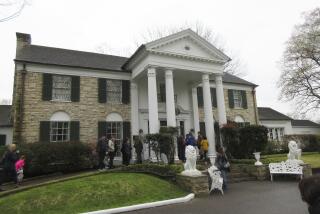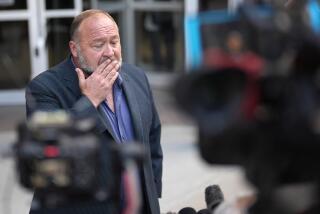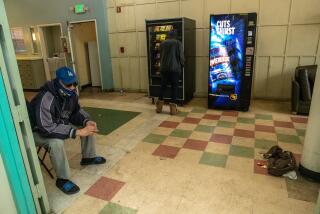Federal Judge Appoints Receiver in TLC Fraud Case
Elderly investors caught in an alleged $159-million securities fraud got a close look Monday at the man accused of masterminding the scheme as a federal judge appointed a permanent receiver to liquidate the man’s company.
E. Frank Cossey, the former chief executive of TLC America Inc. in Brea, sat slightly hunched, clenching his jaw, in a federal court in Santa Ana as a standing-room-only crowd of about 60 investors, insurance agents and estate planners measured their chances for recovery.
Cossey is accused of misleading investors and diverting their funds to his own use in one of the largest alleged frauds in recent memory.
Calling the evidence of wrongdoing “overwhelming,” District Judge David O. Carter made permanent his prior temporary appointment of Robb Evans of Los Angeles as receiver and continued a freeze on Cossey’s assets. A final order was expected late Monday night.
Evans will sell all assets of TLC, which invested in real estate, and return as much as possible to more than 2,000 investors nationwide, whose average age is 67. He said the liquidation could take years.
The investors, who were promised annual returns of 12% to 15%, had been repaid some funds before the Securities and Exchange Commission moved to seize TLC on Oct. 3. But they still have about $130 million tied up in the company, and Evans predicted “significant” losses, though he wouldn’t estimate how much.
Court filings have estimated TLC holdings, which include troubled properties being fixed up for resale and raw land under development in Arizona, to be worth anywhere from $42 million to $175 million.
Surrounded outside court by investors and financial professionals who said they sold TLC investments in good faith, Evans said he would start selling property soon.
Cossey and TLC’s chief financial officer, Gary W. Williams, both 54-year-old Diamond Bar residents, refused to testify. They are targeted in a federal criminal investigation by the U.S. attorney’s office in San Diego, which is seeking to seize Cossey’s $1.2-million home.
Cossey also is accused of having the company contribute $1.5 million to his son’s high school and put $20 million into what the SEC calls a “prime bank scheme,” a separate alleged investment fraud that remains under investigation.
More to Read
Inside the business of entertainment
The Wide Shot brings you news, analysis and insights on everything from streaming wars to production — and what it all means for the future.
You may occasionally receive promotional content from the Los Angeles Times.











